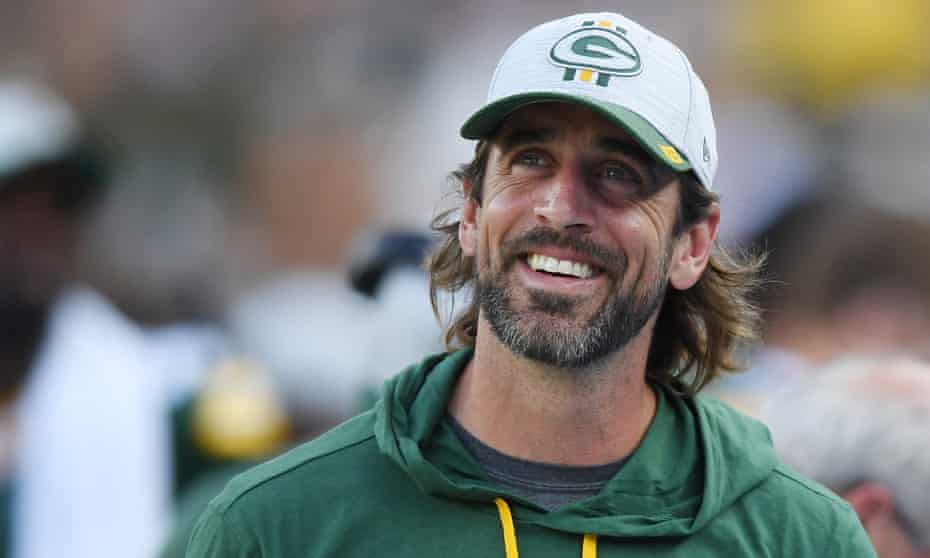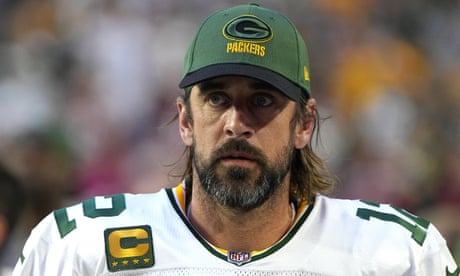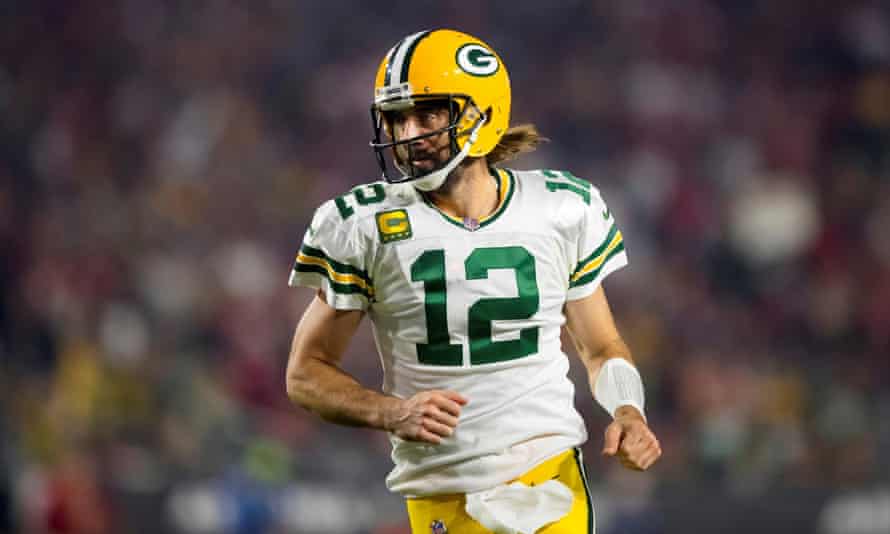
GREEN BAY, Wis. (AP) — A Wisconsin health care organization has ended a nine-year partnership with Green Bay Packers star Aaron Rodgers after the quarterback detailed his reasoning for avoiding the three COVID-19 vaccinations endorsed by the NFL.
A statement posted on Twitter by Prevea Health said the company and Rodgers mutually agreed to end their partnership, effective Saturday. Prevea Health and Rodgers had been partners since 2012.
The statement said Prevea Health “remains deeply committed to protecting its patients, staff, providers and communities amidst the COVID-19 pandemic. This includes encouraging and helping all eligible populations to become vaccinated against COVID-19 to prevent the virus from further significantly impacting lives and livelihoods.”
The move comes a day after Rodgers told “The Pat McAfee Show” he had sought alternative treatments to COVID-19 vaccination because he is allergic to an ingredient in two of the FDA-approved shots. Rodgers, who turns 38 in December, did not say what ingredient he was allergic to, or how he knows he is allergic.
Rodgers has strongly questioned the NFL’s COVID-19 protocols, along with any organization forcing health requirements on individuals.
“I believe strongly in bodily autonomy and the ability to make choices for your body, not to have to acquiesce to some woke culture or crazed group of individuals who say you have to do something,” he said Friday. “Health is not a one size fits all for everybody, and for me it involved a lot of study in the offseason.”
The COVID-19 vaccines authorized for use in the U.S. were tested in tens of thousands of people and proven to be both safe and effective at dramatically reducing the risk of serious disease and death. The vaccines now have been given to more than 200 million Americans and that real-world use plus extra government safety tracking have made clear that serious side effects are extremely rare — and that any risk is far lower than the risks posed by COVID-19.
Rodgers, who has been tested daily as part of NFL protocols for unvaccinated players, found out he contracted COVID-19 on Wednesday. He can’t rejoin the Packers for 10 days and will miss Sunday’s game at Kansas City. He must have a negative test to return to the team on Nov. 13.
The reigning NFL MVP, whose endorsement deals include a starring role in commercials for insurance company State Farm, hinted that his stance on vaccination could have consequences when he described himself Friday as a victim of “cancel culture.”
The Green Bay star once vied for the status of the NFL’s most well-liked player. After Friday’s bizarre interview about his vaccine status, it’s safe to assume those days are behind him

To think, Aaron Rodgers could be hosting Jeopardy! right now. Yes, the Green Bay Packers quarterback was at one point one of the leading candidates to host the iconic quiz show. He got rave reviews during his tenure as a guest host, even, becoming a sort of pop-intellectual figure in American life. Well, after Rodgers’ public-relations disaster of an interview on the Pat McAfee Show on Friday, they can consider themselves fortunate that they dodged at least one bullet on their star-crossed quest to replace the late Alex Trebek.
Rodgers – who is currently unavailable to play with his team after testing positive for Covid-19 – went on the SiriusXM program after reports emerged revealing he was, at best, fudging the truth when he previously claimed he was “immunized” rather than fully vaccinated . The good news was that this time around, he was more direct. The bad news, was that he was probably way too honest for his own good.

Rodgers rips ‘woke mob’ and touts Joe Rogan in first remarks since Covid test
It could have gone much easier for all involved. When given a chance to defend himself for not being vaccinated, Rodgers claimed he had “an allergy to an ingredient that’s in the mRNA vaccines”. Had he stuck with this line of defense, he could have deflected some of the criticism that was to come. Sure, after the “immunized” debacle, Rodgers would not have gotten the benefit of the doubt that he would have been given a week earlier, but it would have been far more prudent than the path he did take directly off the rails.
Instead, Rodgers’ interview featured an avalanche of anti-vaxxer buzzwords and all-too-familiar phrases, each one laying bare the hollowness of his disclaimer that he was not “anti-vax”. You’ll never guess it, but Rodgers did his own research with the aid of none other than conspiracy theory-minded podcaster Joe Rogan. He confirmed that his personal “immunization protocol” included ivermectin and then proceeded to rail against (yawn) “the woke mob” and “cancel culture”. He even threw in a Martin Luther King Jr misquote, as if he were trying to pull off the Full Tucker Carlson.
Advertisement
The interview, which inspired nonstop ridicule on social media, threatens to irrevocably hurt the reputation of someone who – just months ago – was one of the most beloved athletes in the country. Since replacing Brett Favre as Green Bay’s starter in 2008, Rodgers quickly became one of the NFL’s most bankable stars. He established himself as one of the most exciting and talented quarterbacks in the game and his charming off-the-field persona had, until recently, translated into a broad appeal that few other athletes could claim.
How broad? A 2020 survey revealed that just 8% of respondents had a negative opinion of Rodgers. That’s quite impressive considering how little fun it is for non-Packers fans to watch the league’s reigning Most Valuable Player dismantle their team’s defenses on a regular basis. He even helped break down the stereotype that athletes couldn’t also be intellectually curious, a fact which ironically could be his undoing if it led him to take his current stance on Covid-19.

His reputation will not survive this unscathed. As ESPN’s Mina Kimes points out, Rodgers’ irresponsible comments aren’t just harmless nonsense. Having already put others in danger with his decision, he added to the harm by going on record by spreading misinformation couched in the all-too-familiar language of the nation’s massive anti-vaccination movement. “My body, my choice” breaks down when we’re talking about infectious diseases.
That point is key here. Rodgers isn’t the only NFL quarterback who has publicly pushed treatments of dubious medical value. One of the reasons that Tom Brady now plays for the Tampa Bay Buccaneers is that the New England Patriots didn’t approve of his closeness to controversial “nutrition advisor” Alex Guerrero. Meanwhile, the Seattle Seahawks’ Russell Wilson has been selling his fellow athletes on a type of water that supposedly helps treat concussions (there is no credible medical evidence that it does so).
Aaron Rodgers’ Covid-19 case is a failure of leadership that won’t be forgotten
Melissa Jacobs
While both Brady and Wilson received some negative media attention for propping up what we will charitably call “unproven remedies”, they were smart enough to not escalate the bad press as Rodgers has. Also, to state something that should be obvious but clearly isn’t, there’s a difference in magnitude between making wild, untested claims about the benefits of drinking water and spreading proven disinformation during a literal pandemic.
Rodgers isn’t heading towards a full-blown “cancellation”, however much as he seems to be itching for one. Conservative football fans – a not-insignificant portion of the NFL audience – will embrace him as one of their own. He’s already setting himself up for a profitable future in right-wing punditry circles. As his friend Rogan knows, there’s a lot of money to be made in calling out the so-called “woke mobs”.
There will almost certainly be consequences, however. Rodgers might lose a few sponsorships and the NFL – probably more irritated at being criticized than the fact that Rodgers misled the public about his vaccination status – has already launched a media counterattack. The Packers also can’t be happy with any of this, but since Rodgers has already made it clear that he wants out of the organization that might be more of a feature rather than a bug here.
Rodgers’ pocketbook might take something of a hit, but as long as he’s one of the top quarterbacks in the league, he will be fine financially. Where the real damage will come will be in his public standing. Rodgers will never compete for the title of most-liked player in the league again and he has nobody but himself to blame. Not all defeats in the NFL happen on the field.
Explaining Aaron Rodgers' situation, how NFL's COVID-19 protocols work
Considered unvaccinated, quarterback must stay isolated
for at least 10 days
Here's an explanation of the NFL's protocols and a breakdown of Rodgers' case:
Who's responsible for knowing a player's vaccine status?
Each of the 32 NFL teams. Players must submit proof of vaccination to the team, not to the league office.
What is considered sufficient vaccination?
Players must take two shots of one of the approved vaccinations under NFL protocols — Pfizer or Moderna — or one dose of the Johnson & Johnson. As Dr. Allen Sills, the league's chief medical officer, has explained, players who have been previously documented with having had COVID-19 could be considered protected with one shot of those vaccines.
There's also the possibility of a player having antibody levels that show a previous case of the coronavirus, and they can receive one shot to be protected.
"We have very clear protocols on vaccination requirements and what can be considered as being fully vaccinated under those protocols," Sills said.
NFL protocols, created in conjunction with the players' union, oversee not only team facilities but also stadiums, hotels and any travel arrangements.
Did the NFL know Rodgers was unvaccinated?
Yes, as did the Packers and the NFL Players Association.
Rodgers, who says he has an allergy to an ingredient in two of the vaccines, approached the NFLPA during the summer seeking approval of the treatment he took, details of which have not been made public. Dr. Thom Mayer, the union's medical director, consulted with Sills and with infectious disease consultants jointly agreed upon by the NFL and the union. They determined that Rodgers' treatment did not meet the qualifications or protocols to be considered a vaccine.
Will anyone be penalized?
Very likely — if the NFL's investigation, which also includes looking into a Halloween party attended by Rodgers — finds violations of the protocols.
Most responsible would be the Packers for not eliminating any violations. They could be fined and stripped of draft choices. For example, the Las Vegas Raiders were fined $500,000 US last year — when there were no vaccinations available — for breaking protocols. But no teams lost picks in the 2021 draft for COVID-19 violations.
Rodgers, naturally, could be sanctioned by the NFL, too. That probably would involve a fine rather than a suspension.
Sills has been very clear that enforcement of the protocols is "serious business."

No comments:
Post a Comment